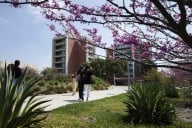You have /5 articles left.
Sign up for a free account or log in.
Howard University and Pearson have put on hold their partnership to create a flagship campus for distance education among historically black colleges and universities, after changing expectations and time constraints derailed a planned launch this fall.
The announcement comes amid reports that the university and its hospital will cut as many as 200 positions over the next several months.
“Howard University and Pearson announce today that the university has decided to roll out its online course offerings in stages, rather than under the more aggressive timeline originally envisioned,” the announcement reads. “Because of this decision, the parties have agreed to set aside the current agreement in favor of a period in which the university will continue to build out its infrastructure for online course offerings.”
Roy L. Beasley, a senior staffer who managed the university’s Digital Learning Lab, said the partnership had unraveled to a point where both sides agreed to cancel their arrangement. Beasley had for years worked to expand Howard's online offerings, and helped identify Pearson as the must suitable partner. He and another staffer involved with the partnership were laid off last Thursday.
“If somebody said to me, ‘Are you surprised that it collapsed?’ No. I’m surprised that it collapsed so soon,” Beasley said.
Announced last August as Howard University Online, the partnership resembled arrangements between Pearson and institutions such as Arizona State University, the University of Florida and Rutgers University. Howard would produce a handful of fully online degree programs for an intended fall 2014 launch, then grow its catalog to up to 25 programs within a few years. Pearson would play a supporting role, absorbing startup costs and providing assessment and marketing services. Once the programs began enrolling students, the two parties would share the revenue.
Howard’s status as a prominent historically black university made the partnership more than just another institution on Pearson’s growing list of clients, however. Since Howard and other historically black colleges emphasize the role of the residential experience, they have been slow to embrace distance education.
That attitude appears to be part of what halted a launch this fall. Beasley said HU-Online's focus on distance education meant the off-campus experience “was the dog, and the campus was the tail that was being wagged.” Facing a lukewarm response from faculty members, the plan experienced an almost “complete evolution” in the past year.
In Tuesday's announcement, the university said it "will continue its significant commitment and mobilization of resources ... to invest in course development, faculty training, and administrative support capacity for online course offerings on a larger scale.” A spokeswoman for the university said it is premature to discuss if Pearson will play any role in that work.
Practically speaking, Beasley said, faculty members will be encouraged to use technology when designing their courses -- for example by flipping the classroom, which could allow students to take five or six courses each semester, up from the usual four. The university hopes an increase in productivity could boost retention and graduation rates, which in turn would lead to more revenue, he said.
The initiative will be rebranded HU-LEARN and HU-TEACH, reflecting that shift in priorities. Beasley said the name should have been changed in May of last year, months before it was approved by both parties. “If you call a duck a tiger, you won’t be surprised if you suspect people will see a bunch of tigers instead of a flock of ducks,” he said.
The move from HU-Online to HU-LEARN and HU-TEACH means “off campus is quite properly the tail of the dog,” Beasley said, but it also means the agreement approved by the Board of Trustees and Pearson’s leadership last summer no longer describes what Howard wants to do with online education -- nor what Pearson signed up for.
“If anybody is at fault, I guess I’ll play the game and say it was me,” Beasley said. “I knew I was evolving this thing, and I knew every time you’re a community organizer and you’re evolving something, everybody in the community may not have gotten the word that the goal posts have moved -- and by the way, we’re playing basketball, not football.”
A ‘Structural Mismatch’
The collapse of the partnership shocked faculty members and trustees, who said they believed HU-Online was on track to launch this fall.
“I’m rarely speechless, but at this moment, I am,” said Richard Wright, director of graduate studies in the School of Communications. Wright also serves as the undergraduate faculty trustee on Howard’s Board of Trustees, but said he didn’t know if the news had reached other members of the board.
Wright’s reaction, in addition to Beasley’s account of the months leading up to when the partnership was unveiled, suggests the project was hampered by communication lapses and scheduling issues.
“There was a feeling we should have gotten into [distance education] a while ago, so we should get into this as fast as possible,” Beasley said. Pearson's main selling point for Howard was that "we needed a partner that had deep pockets.”
Beasley said Howard and Pearson entered into conversations in 2012, planning to launch the following spring -- although the date was quickly pushed back to the fall semester, then to the fall of 2014. The postponed launch would have given faculty members the summer months to create online programs. Instead, the board didn’t vote until June, followed by Pearson’s approval in July. When the partnership was announced on Aug. 2, the summer was all but over.
Pearson’s operations team arrived at Howard in the fall of 2013, only to find the university would not be able to deliver as many online programs as planned. Beasley said Pearson entered into the agreement with the “scale-up” mentality it had used in its partnerships with Florida and Rutgers, while Howard treated the project as a “startup.” Those conflicting expectations were never properly reconciled -- in fact, Beasley said he was unable to present the revised ideas to the board. At the time, the board was also in discussions that led to the resignation of President Sidney Ribeau, in October.
"There was a structural mismatch between the two,” said Beasley, adding that he had hoped Pearson would have been able to modify its expectations. “If [the partnership] had lasted for three years, we would have had enough going so that if Pearson walked away, the positive inertia on campus would have sustained it.”
Wright said faculty members had mixed feelings about the plans for HU-Online. He said the university serves a “fundamental role” to connect with learners through face-to-face courses, but that it could also expand its reach through online programs.
“Howard is a world institution,” Wright said. “We attract students from all over the world, and our reputation, our historical legacy, our connectivity to social issues and social justice -- these issues have propelled us to the attention of many people around the world. Reaching out to them who cannot come to us is valuable. If that’s possible, we should explore it.”
Howard and Pearson will, according to the statement, "revisit a broader rollout, including international offerings and a large-scale marketing and branding campaign around Howard’s online courses, in the future."








